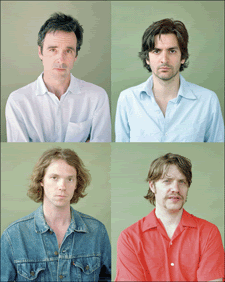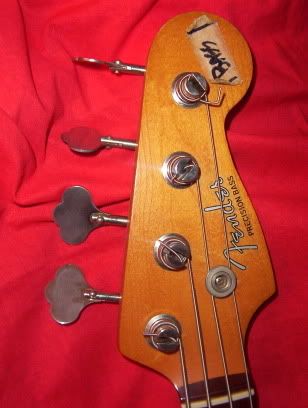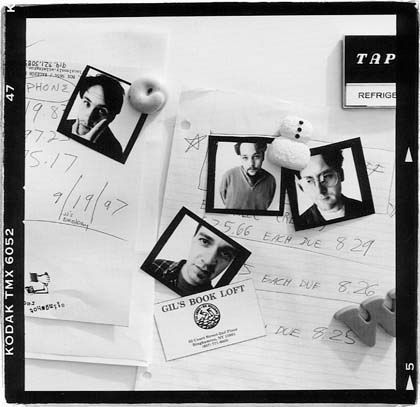On one of the messageboards I lurk, someone recently posted a question- who is your favorite band? I didn't respond, because the answer would be too long and boring for the folks on a Swedish news site. I did decide to take the question here though, where music geekery is the order of the day. Like everyone, my "favorite band" changes depending on my mood, and my "favorite bands" have evolved over time.
The first band I was really passionate about was Van Halen. This was in 1984, and I was 13 years old. I collected all their albums, proudly hung their posters in my room, and drew the band's winged "VH" logo on every surface I could find. Even today I can appreciate Eddie Van Halen's genius for writing catchy rock riffs, which was really the band's greatest strength, not his vaunted guitar shredding. Once goofball singer David Lee Roth screwed things up for everybody by quitting the band to go solo in 1985, things were never the same. I tried to convince myself I liked the bands' "Van Hagar" incarnation (even seeing them live in 1986- my second concert after Rush), but even at such a young age I knew the magic was gone.
I grew up in Maine, so it was inevitable that as a rock fan I would be drawn into the hoary, hallowed halls of Classic Rock. My main source of indoctrination was WBLM, the biggest AOR station in the state. It was through BLM that I learned all the classics- Zeppelin, Stones, Deep Purple, Floyd, Who, Jethro Tull, etc. After watching the 3/4 reunited Led Zeppelin play Live Aid in 1985 (which in retrospect was an awful gig, and what the fuck was Phil Collins doing there?), I had a new favorite band.
I repeated the ritual of collecting all their albums, even getting a few concert bootlegs from a friend's older brother ("Mudslide" 1970, and Copenhagen 1979). I read Stephen Davis' trashy Zeppelin bio
Hammer Of The Gods, which I viewed as a sort of Rosetta Stone to unlock the secrets of Rock. Oh come on, I was 14! Although I listened to other bands, Zeppelin was my favorite. Great songs, great playing, power, mysticism, Zeppelin had it all. Their music inspired me so much I worked all through the summer of 1986 at my father's greenhouse to earn enough money to buy a guitar (I didn't quite earn enough, but Dad gave me the rest- thanks, Dad!). It was a Fender Squire Bullet, which I still own.
By spring 1987, I had discovered that playing guitar was really, really hard. Joe Strummer talked of similar frustration in an interview once, where he described trying to learn a Cream song as a kid- "I got the first bit alright, but then Clapton goes into this solo, and it's like 'weedeeweedeeweedeewee' and I said man, I'll never get this!". Strummer's salvation came via punk rock, mine came in the form of REM. I spent a few weekends painting a house with friends, and one brought a tape of REM's "Murmur" which went into the boombox rotation along with "Houses Of The Holy" and "Hooligans". Over repeated listenings "Murmur" slowly crept into my consciousness, and I began to realize "hey, I can actually play these guitar parts!"
REM would be my introduction to the world of "underground" music. Until then, I thought of rock bands as deities descended from the heavens (usually England) to bring their magical musical gifts to the mortals. REM looked like four regular guys whose songs were still guitar based, but not centered around virtuoso soloing (although I eventually discovered that Mike Mills was a hell of a bass player). REM traded more in melodies and textures than bombastic Rocking Out (something people forget Zeppelin often did, too). I was fascinated. That fall, three school friends and I formed our first band, which we suitably named "The Fringe".
Many bands that form in this fashion pattern themselves on a central influence, and we were no exception- we blatantly ripped off REM at every turn. We covered their songs and unabashedly rewrote their material into our "originals". To counterbalance this extreme REM influence that was obvious even to us, we began to learn covers of other artists- namely ones that REM had done that we learned from bootlegs. We figured we were safe because back then, very few people in Maine had ever even heard of REM. Have no fear, recordings of The Fringe will never stain the pages of the Cutout Bin.
It was during this time that I began to notice an extreme conservatism in the music fans in my area- rock and roll was past tense. It had happened, and my generation had missed it. The gods had come and gone- Zeppelin, The Who and Pink Floyd (this was before the "reunion") had all broken up. Neil Young was making bizarre records no one liked (this was before "Freedom"), the Stones continued to hang around, but everyone knew their spark was gone. There was new music of course, and some of it was deemed listenable (ZZ Top and Whitesnake, for example), but no one would ever again scale the Mount Olympus heights of Rock greatness like the bands of yore.
This attitude pissed me off. I viewed music as a living legacy- from the first chanting cavemen through wandering minstrels, sea shanties, Beethoven, gospel, blues, jazz, Chuck Berry, the Beatles, Led Zeppelin and The Sex Pistols on down to my crappy band banging out REM covers in Steve Williams' basement. I found the attitude of classic rock fans stifling, so as I began to explore the world of "underground" music, I stupidly purged myself of all classic rock except The Who (who I somehow understood to be different in some way) and Pink Floyd (who I just plain liked). In Stalinist fashion, Led Zeppelin were repudiated, their records sold off. It would be several years before I realized I'd been stupid to hold the bands themselves responsible for the attitudes of their fans, and I eventually re-acquired the Zeppelin catalog, which I still listen to occasionally (except for the radio songs- I was burned out on those when I was 16).
By 1988 REM had begun to change, as all artists do, and I wasn't happy with their new direction. I mean, listen to any song off "Murmur", then try listening to crap like "Stand" and tell me they hadn't started to suck. I'd read a review of the Replacements' "Pleased To Meet Me" in Musician magazine, and it sounded cool so I ordered it from the Columbia Record And Tape Club. Usually, buying records based only on reviews is a really bad idea (ask anybody who bought a Royal Court Of China record), but this time it paid off in spades. The Replacements were my idea of the perfect band: don't-give-a-fuck balls-out rock based on well written songs whose lyrics were insightful and showed genuine emotion. They also had an underdog vibe that Paul Westerberg once described as "four geeks who got invited to the cool kids' party and were dumb enough to show up". By the time I left for college in the fall of 1989, the Replacements had eclipsed REM for the title of "favorite band".
I took my bass with me and started a band that was, naturally, based on the Replacements. This time though we didn't cover or steal their songs, we copped their attitude. We became infamous for shambolic shows, stupid antics, and always shooting ourselves in the foot. Four years later the band was still together, although we'd changed names and my friend Jim (guitar/vocals) and I were the only original members. By then we'd managed the task of
incorporating influences rather than simply regurgitating them (this band was called Truckasaurus, and will eventually be chronicled here).
In college I sampled a bewildering array of music, much of which is still dear to my heart, some of which is not (I may still have that first Material Issue record, I'm not sure). It was then that the concept of having a "favorite band" sort of lost meaning for me. There was no longer a single band that I loved above all others, but instead a gigantic library of music to choose from, depending on the situation and my mood. For example, if I'm going to be driving long distance I might choose any (or none) of the following-
Bob Dylan- "Blonde On Blonde"
Bruce Springsteen- "The River"
Eleventh Dream Day- "Prairie School Freakout"
Neil Young- "Ragged Glory"
The Buzzcocks- "Singles Going Steady"
One of these might be my "favorite" for a day or two, but after that I'll be on to something different. If I had a gun to my head and was forced to choose a short list of artists I like the most after years of listening, it would probably look like this-
Bevis Frond
The Replacements
The Who
Neil Young
So... who's
your favorite band?



